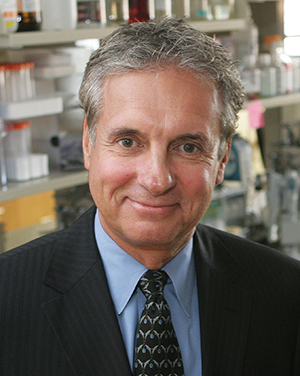Research, News & Discoveries
-

Former VU Teacher and Nobel Laureate Paul Greengard Dies
Neurobiologist Paul Greengard Dies The Nobel laureate revolutionized our understanding of how brain cells communicate. Apr 15, 2019 ASHLEY YEAGER, The Scientist (the-scientist.com) Nobel laureate Paul Greengard, a neurobiologist at Rockefeller University, died Saturday (April 13). He was 93. Greengard is best known for his work showing that the… Read MoreApr. 15, 2019
-

Study reframes approach to targeted therapy resistance
Apr. 11, 2019, 9:02 AM From left, Benjamin Brown, Christine Lovly, MD, PhD, Yun-Kai Zhang, PhD, Jens Meiler, PhD, and colleagues are exploring new ways to understand resistance to targeted cancer therapy drugs. (photo by Anne Rayner) by Tom Wilemon When a tumor mutates and develops resistance to a targeted… Read MoreApr. 11, 2019
-

Discovery aids search for cancer biomarkers
Discovery aids search for cancer biomarkers Apr. 11, 2019, 10:39 AM Research by Robert Coffey, MD, left, Dennis Jeppesen, PhD, and colleagues has revealed a new way cells shed DNA into the bloodstream. (photo by Steve Green) by Bill Snyder A report by researchers at Vanderbilt University Medical Center has… Read MoreApr. 11, 2019
-

Cancer’s SOS
Mar. 28, 2019, 11:30 AM by Sanjay Mishra RAS proteins regulate growth, survival and proliferation of cells in their active state. However, the uncontrolled activation of RAS causes approximately a third of all tumors and helps cancerous cells evade anti-cancer drugs. Thus RAS is an important target for effective anti-cancer treatments. Read MoreApr. 4, 2019
-

Unraveling endocytosis
Mar. 28, 2019, 10:45 AM by Niyati Vachharajani Endocytosisis a highly regulated process in which cells take up substances packaged in vesicles by internalizing the plasma membrane surrounding the cargo. In yeast, the enzyme Rsp5 regulates most endocytic events with the help of arrestin-related Rsp5 adaptor proteins called ARTs. Yet much… Read MoreApr. 4, 2019
-

Controling RNA Polymerase Dynamics
Reproduced from Wikimedia Commons through the Creative Commons CC BY-SA 3.0. The process of transcription is extremely complex, requiring the well-coordinated interactions of numerous modulatory proteins and protein complexes. Two key players in this process are cyclin-dependent kinase (CDK)7 and CDK9, both of which phosphorylate multiple sites on RNA polymerase… Read MoreMar. 22, 2019
-

Targeting the WIN Site of WDR5
Proposed mechanism of WIN site inhibition. The inhibitor (i) binds to the WIN site of WDR5, displacing it from its binding site on chromatin. A major result is a decrease in transcription of genes encoding ribosomal proteins (RPGs), leading to a disruption of protein synthesis, the nucleosomal stress response, and… Read MoreMar. 21, 2019
-

Correctly copying DNA
Mar. 14, 2019, 11:45 AM by Sanjay Mishra The enzyme topoisomerase II resolves topological roadblocks that form during the copying and expression of genetic material by generating double-stranded breaks in one DNA segment, transporting another DNA segment through the break, and rejoining the two ends. Tight regulation of the DNA breakage/rejoining… Read MoreMar. 15, 2019
-

New way to stimulate learning?
Mar. 14, 2019, 1:00 PM by Bill Snyder The vagus nerve connects the brain and organs throughout the body. Vagus nerve stimulation (VNS) implants have been used for more than 20 years to treat drug-resistant epilepsy. In a study published in the Journal of Neuroscience,… Read MoreMar. 15, 2019
-

Reprogramming cells for kidney repair
Mar. 14, 2019, 10:45 AM by Kelsey Herbers Chronic kidney disease is on the rise worldwide. Approaches to develop regenerative or cellular therapies are hindered by the complex cellular structure of the kidney, which is composed of about 1 million microscopic “filters” called nephrons. Lauren Woodard, PhD, and… Read MoreMar. 15, 2019